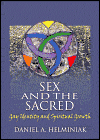 Sex and the Sacred:
Sex and the Sacred:
Gay Identity and Spiritual Growth
By Daniel Helminiak
Harrington Park Press, 235 pages, pb, $16.
Reviewed by Toby Johnson
In engaging, easy-to-read prose, Daniel Helminiak addresses the central work of religion and spirituality today: to tease out the rich meaning and significance behind the myths and doctrines that have come down to us in the great traditions without getting trapped in literalism and superstition, that is, to rearticulate religion so it makes sense—and makes sense especially to and about—us lesbians and gay men who have been so influential in creating religion and yet who have been so victimized by it.
In this collection of essays spanning his career as theologian, Scripture scholar, psychologist, and gay spiritual apologist, Helminiak shows how true Christianity is not inimical to modern LGBTQ consciousness and indeed that spirituality—and gay spirituality in particular—transcends any and all specific religions.
Central to Helminiak’s thinking, expressed through some six books, is that spirituality is common to all human beings, including, of course, gay human beings, and that it is not necessarily linked with religion or belief in God. Indeed, the link is the reverse of what’s usually thought: it is spirituality that comes first—“the infinite longings of the human heart”—then come God and belief as natural outworkings and projections of that hunger.
Spirituality is a human psychological enterprise. And every person deals with these issues whether they identify them as religious or not. And because these issues are psychological, they necessarily include sexuality and they call out for sexuality to be understood with respect and not condemnation. For spirit comes out of the human heart and seeks to satisfy the hunger of the heart, not down from God or Church officials demanding repression of the heart for the sake of order and societal authority. Helminiak observes that this distinction between spirituality and religion (and God) may be his most important contribution.
The book consists of some fifteen essays that address various issues of importance to gay people: from coming out and achieving self-acceptance, the longing of the heart for infinity, and sexual ethics to the real lesson of Jesus’s example, the Church, the Bible, gay marriage, and even the effects in the human spirit of the terrorist war. The chapters are independent of one another, but read consistently as a more and more comprehensive presentation of what religion could and should be.
Daniel Helminiak is a precise and thorough-going thinker. Some of the arguments in the book may seem obscure and tortured. You can tell Helminiak doesn’t want to just cut through the Gordian Knot of Christian doctrine, but respectfully and intelligently to untie it strand by strand. Still the book is readable and entertaining, filled with interesting tidbits of Biblical and Church history that change how everything should be understood. His analysis, for instance, of the Council of Nicaea places the “divinity of Jesus” in historical context; what that idea meant to the creators of the Christian religion is much more subtle than the common Christian myth.
Perhaps most interesting and relevant are his discussions of real life issues: the spiritual lessons of AIDS, for instance, and appropriate gay sexual ethics. Even if you’re not especially concerned about Church history, these topics hit home—and with such positive and caring attitude.
Daniel’s right, I think, that his well thought out and thorough-going distinction between spirituality and religion is a major contribution. And this particular volume of his presents these arguments sensibly and very readably.
The essays on heaven as everlasting orgasm and on the homosexual modeling of relations within the Blessed Trinity are delightfully provocative and downright queerly brilliant.
Toby Johnson is former publisher and current contributing editor to White Crane. His newest book, Two Spirits, is reviewed in this issue.